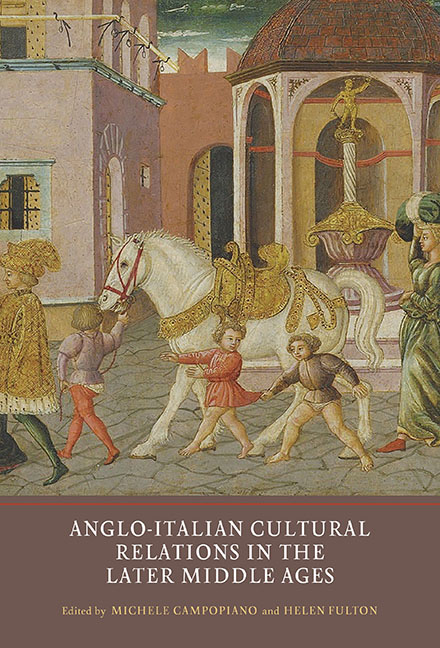Book contents
- Frontmatter
- Contents
- List of Illustrations
- List of Contributors
- Acknowledgements
- List of Abbreviations
- Introduction: Historical and Literary Connections between Britain and Italy in the Middle Ages
- 1 Writing, Translating and Imagining Italy in the Polychronicon
- 2 Richard de Bury, Petrarch and Avignon
- 3 The Reception of Italian Political Theory in Northern England: Bartolus of Saxoferrato and Giles of Rome in York
- 4 Italian Firms in Late Medieval England and their Bankruptcy: Re-reading an Old History of Financial Crisis
- 5 ‘Nostri Fratelli da Londra’: The Lucchese Community in Late Medieval England
- 6 ‘Saluti da Londra’: Italian Merchants in the City of London in the Late Fourteenth and Early Fifteenth Centuries
- 7 Political Joachism and the English Franciscans: The Rumour of Richard II's Return
- 8 Urban History in Medieval and Early Modern Britain: The Influence of Classical and Italian Models
- Afterword: The Nature of Anglo-Italian Cultural Exchanges
- Bibliography
- Index
7 - Political Joachism and the English Franciscans: The Rumour of Richard II's Return
Published online by Cambridge University Press: 03 July 2019
- Frontmatter
- Contents
- List of Illustrations
- List of Contributors
- Acknowledgements
- List of Abbreviations
- Introduction: Historical and Literary Connections between Britain and Italy in the Middle Ages
- 1 Writing, Translating and Imagining Italy in the Polychronicon
- 2 Richard de Bury, Petrarch and Avignon
- 3 The Reception of Italian Political Theory in Northern England: Bartolus of Saxoferrato and Giles of Rome in York
- 4 Italian Firms in Late Medieval England and their Bankruptcy: Re-reading an Old History of Financial Crisis
- 5 ‘Nostri Fratelli da Londra’: The Lucchese Community in Late Medieval England
- 6 ‘Saluti da Londra’: Italian Merchants in the City of London in the Late Fourteenth and Early Fifteenth Centuries
- 7 Political Joachism and the English Franciscans: The Rumour of Richard II's Return
- 8 Urban History in Medieval and Early Modern Britain: The Influence of Classical and Italian Models
- Afterword: The Nature of Anglo-Italian Cultural Exchanges
- Bibliography
- Index
Summary
In the years following Richard II's deposition by his cousin Henry IV, rumours concerning his survival were in abundance. As Simon Walker has observed, these were ‘nourished in the fertile ground of prophetic speculation’. Certainly, this was a period of considerable prophetic activity, and I suggest that the rumour of Richard's return may, at least in one of its earliest forms, owe a considerable debt to contemporary prophecy. I refer to the claims of a number of Franciscan friars in the years 1401–2, who prophesied the old king's return to do battle against the new. The details of this prophetic activity survive only as shadowy allusions in contemporary chronicles, but there is a distinctive politicalliterary context on which we might draw to understand the uses of prophecy among the English Franciscans during this period.
This chapter considers Franciscan, and broader monastic, English engagements with prophetic texts inspired by the prophetic exegeses of Joachim of Fiore, the twelfth-century Calabrian abbot and founder of the monastery of San Giovanni. This material blurred the division between the sacred and secular, and gave ecclesiastical authors a mechanism through which they might withstand tyrants and hail imperial heroes. A prophetic vogue that began in southern Italy during the early thirteenth century, political Joachite texts circulated across Europe, and, I suggest, came to determine the shape of political involvements among the English Franciscans in the troubled years of the early fifteenth century. This is an important period in the history of English political prophecy: during these years the earliest legislation against the dissemination of political prophecies was introduced, in 1402, and again in 1406. Although the wording of these laws suggests that they were directed against the Welsh in 1402, and in 1406 against the Lollards (whose own engagements with prophecy remain obscure), they might be more fully understood as a response to a broader contemporary prophetic oppositional vogue, a movement in which the Franciscans stood front and centre.
The return rumour
The rumour of Richard's return appears to have first taken root among Franciscan friars in Norfolk towards the end of 1401 or early 1402, and reappeared in the spring of 1402 at a number of houses in the English Midlands, at Aylesbury, Leicester and Northampton. The fullest account of the trials of friars charged with the dissemination of the rumour is preserved in the first continuation of the Eulogium historiarum.
- Type
- Chapter
- Information
- Anglo-Italian Cultural Relations in the Later Middle Ages , pp. 128 - 149Publisher: Boydell & BrewerPrint publication year: 2018



